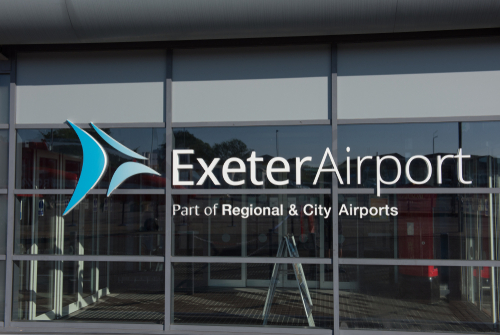Talking Exeter Airport’s sustainability plans
- Like
- Digg
- Del
- Tumblr
- VKontakte
- Buffer
- Love This
- Odnoklassniki
- Meneame
- Blogger
- Amazon
- Yahoo Mail
- Gmail
- AOL
- Newsvine
- HackerNews
- Evernote
- MySpace
- Mail.ru
- Viadeo
- Line
- Comments
- Yummly
- SMS
- Viber
- Telegram
- Subscribe
- Skype
- Facebook Messenger
- Kakao
- LiveJournal
- Yammer
- Edgar
- Fintel
- Mix
- Instapaper
- Copy Link
Posted: 29 December 2023 | Stephen Wiltshire | No comments yet
Managing Director of Exeter Airport, Stephen Wiltshire, answered questions, in our sustainability supplement, about his airport’s sustainability plans, challenges the plan faces and working to support hybrid electric flights.


Talking Exeter Airport's sustainability plans.
What are Exeter Airport’s plans for sustainability and working toward net zero?
Across regional and city airports there is a continued focus on carbon emission reductions. In terms of Exeter’s own plans, the airport is a signatory to the Airport Carbon Accreditation Scheme and is working through that process, with Level 2 expected to be achieved at the end of the financial year.
In addressing our own energy consumption, we continue to move towards all-LED lighting and the phased electrification of our ground handling fleet of vehicles. There is potential investment in rooftop and/or ground-mounted solar PV.
We also seek to influence staff behaviours with a switch-off campaign, car-share scheme, and cycle to work scheme. We are proud to have had a zero to landfill policy for over 10 years and we are working with third-party suppliers and contractors to ensure they do the same.
We work with local and regional transport partners to encourage greater public transport links to and from the airport. There will be a new 30-minute bus service, starting at the end of October, which connects the airport to Exeter City centre, local park and ride facilities and the railway network.
More widely, the Regional and City Airports (RCA) group is working to provide sustainable aviation fuel (SAF) to airline customers. This summer, they signed a memorandum of understanding with Cranfield University to ‘promote the development, testing and deployment of innovation across the aviation industry’.
What do you see as the key challenges for delivering net zero?
There are three key challenges: reducing the carbon emissions that we can control; working with operators to reduce carbon emissions from aircraft movements and supporting passengers to make an informed choice when travelling to and from the airport.
Decarbonising aviation will take an industry-wide effort and we’re proud to have been part of the 2ZERO electric hybrid trial last year. This was a project supported by UK Research and Innovation’s Future Flight Challenge with Ampaire Ltd and a range of partners including Exeter Airport, Rolls-Royce Electrical, University of Nottingham, Loganair, Cornwall Airport Newquay, Heart of the Southwest Local Enterprise Partnership and UK Power Networks Services.
Decarbonising aviation will take an industry-wide effort and we’re proud to have been part of the 2ZERO electric hybrid trial last year.”
This project involved demonstration flights on two Civil Aviation Authority approved routes between Exeter Airport and Cornwall Airport Newquay using Ampaire’s Electric EEL aircraft. The EEL – a modified U.S. built Cessna 337 Skymaster – features a battery-powered electric motor at the front and conventional combustion engine at the rear. This aircraft enables a reduction in emissions and operating costs by as much as 30%. The aircraft flew between Exeter and Newquay (a distance of 85 miles) on a combination of battery and piston power and collected valuable fuel saving, efficiency and noise data.
What does Exeter Airport need from the UK Government?
It’s about creating the right environment for investment. This could be through R&D programmes allowing more regional airports into the Government’s proposed Investment Zones, which seeks to help drive regional growth. We would also like more focus on long-term skill requirements of training Air Traffic Controllers and Engineers. This would require long lead times.
What is your proudest sustainability achievement to date?
The 2ZERO test flight between Exeter and Newquay last year was a real highlight, because it demonstrated the potential for hybrid electric aircraft on regional routes.
What have you learnt through the Future Flight programme?
The Future Flight programme has shown us both the scale of potential opportunity and the challenge. A lot of effort is going into technological development of the air and it’s important that the infrastructure on the ground keeps pace. RCA’s work with Cranfield will be to consider how electric or hydrogen aircraft could be deployed at commercial airports in the future and the practical reality of what happens when the aircraft is on the ground (i.e., handling, recharging, maintaining).
What role do you think the Southwest can play in supporting net zero?
The Southwest is the perfect testbed for sustainable aviation. We have a combination of aerospace giants like Airbus, Rolls Royce, GKN and Leonardo; a wide range of regional airport infrastructure; strong R&D credentials, excellent skills base and relatively uncluttered airspace.
Where do you see the opportunities for collaboration?
Across the board really, from sharing best practice around airport operations to cutting-edge development of hydrogen and electric aircraft ecosystems. We are working closely with the Heart of the Southwest Local Enterprise Partnership and other partners to establish a future aerospace test environment across the Southwest.
About the airport
Exeter Airport in Devon, South West England, is part of the privately-owned Regional and City Airports (RCA) group, which also owns Bournemouth Airport, Norwich Airport and Coventry Airport.
About the author


He has received qualifications in Managing Safely from IOSH Managing Safely Course.
Related topics
Emissions, New technologies, Operational efficiency, Sustainability, Sustainable development, Terminal operations
Related airports
Bournemouth Airport (BOH), Cornwall Airport Newquay (NQY), Exeter Airport (EXT), Norwich Airport (NWI)
Related airlines
Related organisations
Airbus, Civil Aviation Authority (CAA), GKN Aerospace, Regional and City Airports (RCA), Rolls Royce, UK Power Networks Services


















